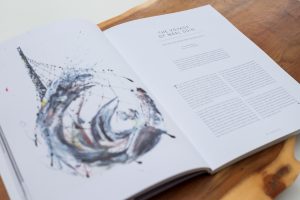Do We Need Backbone?
by Joseph Rodgers | March 18, 2024
 To read Moby Dick is to learn that Herman Melville really cares about whales. Not in what they represent, not for how they make us feel: whales matter as whales. In this sense, he is a bit of a surprise to readers whom secondary education has trained to search for the point behind the premise. Melville is no allegorist, and so much the better. It’s no surprise, then, that the novel’s ship is partly built out of the bones of the whales that have been hunted: whales are always there, moving the novel forward. If our politics is going to care about people (which would be a lovely thought) then our systems ought to be built from people, too. Although Melville’s literal, predatory way would be alarming, it might nonetheless seem that the language of politics ought to be built by the people it serves—and all of the people too, right down to the bone.
To read Moby Dick is to learn that Herman Melville really cares about whales. Not in what they represent, not for how they make us feel: whales matter as whales. In this sense, he is a bit of a surprise to readers whom secondary education has trained to search for the point behind the premise. Melville is no allegorist, and so much the better. It’s no surprise, then, that the novel’s ship is partly built out of the bones of the whales that have been hunted: whales are always there, moving the novel forward. If our politics is going to care about people (which would be a lovely thought) then our systems ought to be built from people, too. Although Melville’s literal, predatory way would be alarming, it might nonetheless seem that the language of politics ought to be built by the people it serves—and all of the people too, right down to the bone.
Currently, we use the language of bodies all the time in politics, often without even noticing it. We wish our politicians had backbone; we worry about corporate capture; and some want to wield power over the organs of state.
Politics is an intensely personal thing: every decision made by the government affects somebody, and usually lots of somebodies. Therefore, the technocratic discourse that dominates ‘sensible’ politics often feels overly mechanical and impersonal. When questioned in 2023 as part of the ongoing Covid inquiry, George Osborne described austerity as “essential to rebuild fiscal space to provide scope to respond to future economic shocks.” This is a lot of verbiage and Osborne’s academic register clearly finds itself wanting. Instead of “fiscal space,” I might ask you to think of each of the 250,000 children kept below the poverty line due to the introduction of the two-child benefit cap; or compare Osborne’s “future economic shocks” with the global pandemic and enforced government lockdown that we all individually dealt with.
While bodily imagery can include those who feel excluded from politics by daunting political jargon, it can also be exclusionary itself. Far too often, politically active people invoke bodies to incite xenophobia, or to close off progressive possibilities. They imagine the nation-state to be a single body, and those sealed outside of that body are presented as invasive pathogens threatening the overall health of the country. Douglas Murray, for example, describes migration as resulting in Europe’s “present sickness”; or, when conservative-minded politicians seek to undermine progressive movements, they often appeal to the need for ‘strong leaders’ who are a ‘safe pair of hands’. The discourse of bodily capability is key to the appeal of status-quo politicians.
So, given the exclusionary use to which the body has been put in contemporary politics, might we not be better off without it? Is it time to give up on any pretences that we can turn the body into an inclusive metaphorical symbol? It is tempting to try to win political arguments by using familiar rhetoric, but perhaps, in this case, it would be better to give up the ghost.
***
“I gather you’ve done one of these before,” a man in scrubs and Star Wars socks recites as he finishes typing what looks like an email. Beside him sits a girl about my age. Her hair is dyed a faintly pinkish white.
“Yes. A couple of times.”
“Not for a while though, I gather.”
“No.”
***
Bodies can be exclusionary: after all, a body is a distinct thing and you either fit the mould or you don’t. But equally, bodies are one thing that all of us have in common. It’s hard to believe that there’s much left to say that doesn’t bear reference to them. For instance, accounts of the NHS or of foreign policy which don’t touch on their real effect on real bodies surely miss the point. When politicians promise to increase the NHS budget or the amount of foreign aid by so many billions of pounds, their figures feel meaningless. Their plans need grounding in the language of the real bodies which the money will help. What we need to do is speak about bodies as they actually are: separate, finite, vulnerable.
This is about realising that there are no bodies apart from each of our own. There’s no one to save us but each other. In an odd way, we can almost find an ally in Margaret Thatcher’s infamous claim that “there’s no such thing as society. There are individual men and women and there are families. And no government can do anything except through people, and people must look after themselves first.” But Thatcher misses the point here. Where she draws a line between “society” and “individual men and women,” we should really see these two things as synonymous. Society is each other. It is not just a cliché that we all breathe the same air: for the most part, all of my deepest problems are everyone’s deepest problems. A collective conception of society can do good, so long as that it is based on that which actually exists in each of us already.
If this all sounds a bit naïve or even hippy-dippy, then I grant you that I am offering no easy route forward. None of this stuff is going to win a landslide majority at the next general election. However, I would like to suggest that this kind of thinking has shown itself to be politically powerful. In the Merchant of Venice, Shylock contests a disembodiment of the political other, crying out: “If you prick us, do we not bleed? If you tickle us, do we not laugh? If you poison us, do we not die?” As Shylock suggests, the reality of our shared human bodies is fundamental to a collective politics. We care about each other, we try to build a politics which does this, too, because we see that other people are not just figures of metaphor, mere embodiments of some abstract ‘society’, but that they are flesh and blood just like me. My pains might be their pains too. I can hear them telling me this; but more, I can see it on their bodies.
***
The man shows me into a room separated by glass. He asks me to stand straight as he adjusts a plastic rod to press against my chin. The girl remains seated, and, if I turn my eyes, I can see she is looking at her phone. The man, who I have to admit is very friendly, pulls down the two plastic arms of the machine that now surrounds me, and fits them into my ears.
“We do this so that you stay still. I know it’s uncomfortable, but the X-Ray won’t come out right otherwise.”
He goes back into the other room.
The state is in my ears. It’s all around me. It sounds almost rock and roll.
***
When we start to understand that society is just each other as opposed to some great, amorphous whole, this leads to a greater appreciation of societal needs. Each of our institutions are full individuals who, despite all of the austerity, despite the hostile environments, exhibit extraordinary levels of empathy. What we often forget in grand plans to revive our failing public services is that there are people who already care about other individuals in the way that we hope our politics might. It’s well-known that ‘the NHS is crumbling’, but this avoids the fact that those ailing buildings are staffed by people (1,400,000 of them). Rather than grand plans and sweeping metaphors, our political movements might instead harness each individual moment of generosity—of solidarity—as the basis of progressive politics.
This way of thinking can even present a different way of gaining popular support. With the rise of 24-hour news media, politics now feels increasingly like an endeavour separate from our lives, relegated to sit alongside fiction and entertainment. If we understand that the effects of politics are always embodied—by bums on train seats or vaccines in bloodstreams—then we can begin to build an alternative on newer grounds.
At the start of Moby Dick, Ishmael thinks about how his life might be placed in the list of events that constitutes ‘history’:
Grand Contested Election for the Presidency of the United States. “WHALING VOYAGE BY ONE ISHMAEL. BLOODY BATTLE IN AFFGHANISTAN.”
There’s an important point here: Ishmael is contextualising political and historical events within the framework of his own life. And this is something we all do because we all live independent lives. Ishmael’s experience of political history is seen through his eyes alone. All of us can only understand politics as it fits into our own inevitably separate lives, as it materialises in real effects on our real bodies. When we accept this, and we adjust our rhetoric accordingly, we might have made a start towards a politics that cares about the people. Ultimately, politics is no abstract game. Politics is people—every one of us.
***
After the X-Ray, I walk back to the waiting room. There are two receptionists. One is on the phone with a man who cannot book an appointment because his generation were not taught to use computers. I sit down in a chair as far as possible from anyone else waiting. Melville has been in my coat pocket the whole day, but I cannot bear to read one more page about whales. Instead, like everyone else, I look at my phone. I open apps I know will offer nothing to me except promises I can’t fulfil.
A man is wheeled past. The convention, I have learnt, is that those about to have surgery are wheeled to the operating theatre, even if they are perfectly able to walk. I wonder if it is so people don’t have second thoughts. I wonder if it is a performance of vulnerability or dependence which will, soon, inevitably, reveal itself as less than myth and more than staged. ∎
Words by Joseph Rodgers. Art by Alice Robey-Cave.




